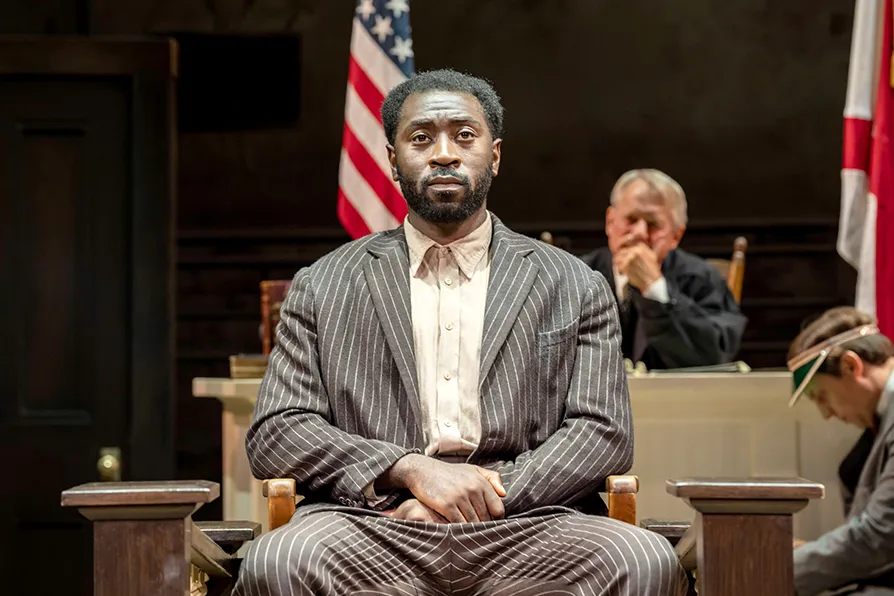RITA DI SANTO draws attention to a new film that features Ken Loach and Jeremy Corbyn, and their personal experience of media misrepresentation
Error message
An error occurred while searching, try again later.SUSAN DARLINGTON applauds a new version of the classic novel of racial injustice in the deep South

 BLACK AND WHITE CASE: Aaron Shosanya as Tom Robinson in To Kill A Mockingbird. [Pic: Johan Persson]
BLACK AND WHITE CASE: Aaron Shosanya as Tom Robinson in To Kill A Mockingbird. [Pic: Johan Persson]
To Kill A Mockingbird
Leeds Playhouse
★★★★
HOW much should a well-loved novel be updated to acknowledge cultural change? That was the unenviable question faced by Aaron Sorkin when he was tasked with adapting Harper Lee’s To Kill A Mockingbird for the stage.
A mainstay of GCSE English for many years, the 1960 novel has been celebrated for its exploration of racial injustice in the deep South. In recent years, however, it’s become more problematic: banned in several US states for its racist language and criticised for its white saviour narrative.
Sorkin sought to address this in his 2018 adaptation by shifting character emphasis, drawing on what’s implicit in the text. As the book’s moral compass, it’s Atticus Finch (Richard Coyle) who sits on the shakiest ground. The lawyer who defends Tom Robinson (a stoic Aaron Shosanya) against false accusations of rape, he becomes a more complicated hero in what’s essentially been turned into a courtroom drama.
As in the novel, the story is seen through the child’s eye view of Scout (an impressive Anna Munden), Jem (Gabriel Scott) and Dill (Dylan Malyn). However, Sorkin has played with timelines in order to frame it within the children’s quest to solve how their racist neighbour Bob Ewell could die after falling on his own knife.
Having adults assume the role of children is a risky strategy but it pays off with some suspension of disbelief. While Dill may be largely played for laughs, Scout’s innocent worldview is used to challenge some of Atticus’s beliefs. His call to be non-judgemental, especially, is shown to have flawed moral integrity.
Atticus is also gently challenged on his views by housekeeper Calpurnia (Andrea Davy), who’s given a stronger voice than in the book. Her passive-aggressive one-liners carry humour and anger, particularly when she questions whether she — and by extension the town’s black community — should be expected to thank Atticus for defending Tom.
Doubling down on the challenge to Atticus’s belief that the townsfolk of Maycomb are essentially good is the presentation of Mayella and Bob Ewell (Evie Hargreaves and Oscar Pearce), the alleged victim and her father. Their testimony is filled with anger and betrayal, and the tension in the venue is palpable as they use language that’s all too recognisable from the resurgent far right.
The decision not to have a jury on stage is a subtle way in which to involve the audience in complicity with the verdict. It’s an effective part of Miriam Buether’s mobile set design, which smoothly moves between courtroom and more domestic scenes, and Bartlett Sher’s unshowy direction.
Their only misstep is the play’s end, when the cast perform the spiritual song Joy Cometh In The Morning. It shows Atticus’s status as moral compass to be tarnished but not unbroken, which is slightly unsatisfactory. That said, it’s hard to imagine any other resolution that doesn’t stray too far from Lee’s original text.
Within these confines, the play does its best to keep the audience reflecting on the current state of the nation and what they can do to take a stand.
Runs until October 4, then touring. Box office: (0113) 213-7700, leedsplayhouse.org.uk.










